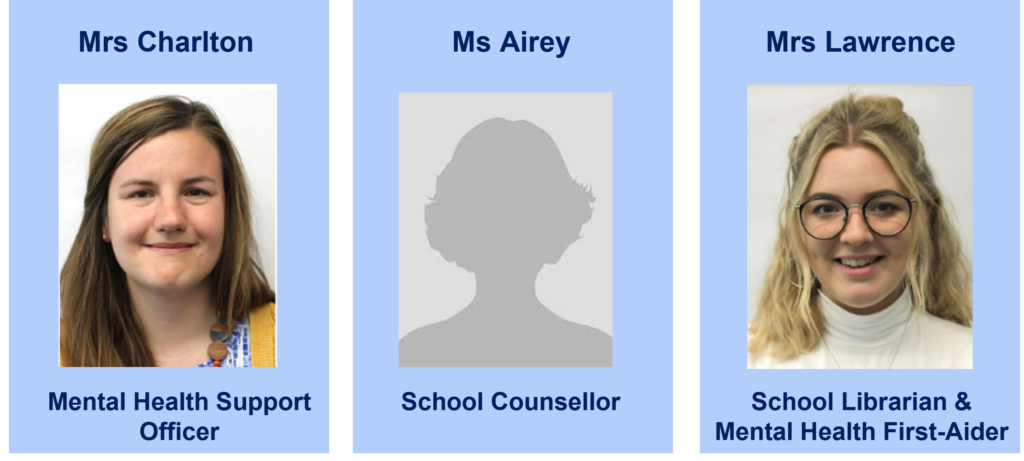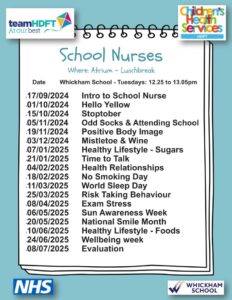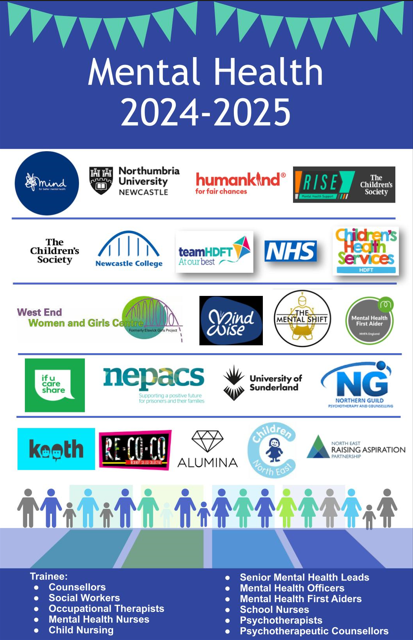Mental Health and Wellbeing at Whickham School
Mental Health includes our emotional, psychological and social well-being. It affects how we think, feel and act. It also helps determine how we handle stress, relate to others and make choices.
As a school, we want everyone, both pupils and staff, to know:
- That isolation and loneliness can affect everyone and that it is very important to discuss feelings and seek support;
- Where and how to seek support;
- That mental well-being is a normal part of everyday life;
- That there is a normal range of emotions;
- How to recognise and talk about emotions;
- The benefits of physical exercise, time outdoors, community and extra-curricular participation and volunteering.
Make Room for Mental Health
We are committed to supporting the Mental Health of our young people, staff and community. This year we will be focusing on making room for Mental Health in our day to day lives. We will be working in partnership with a range of local, regional and national external agencies to support and enhance our mental health provision.
Our Vision – MAGIC
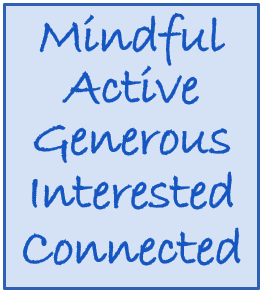 Promoting positive mental health and well-being is something that everyone at Whickham School believes in deeply. We have a specialist Mental Health Support Team in school that offers high-quality emotional support, guidance and counselling to those in need.
Promoting positive mental health and well-being is something that everyone at Whickham School believes in deeply. We have a specialist Mental Health Support Team in school that offers high-quality emotional support, guidance and counselling to those in need.
We have always tried to be ahead of the curve when it comes to a whole school commitment to improving mental health and emotional well-being and understanding the wide-ranging influences that can affect our students. Our vision is passionately championed by our dedicated Mental Health Support Team, our Senior Leadership Team and Governing Body and is embedded in the culture and being of every member of staff.
Our Commitment
We aim to:
- Remove the stigma of mental health.
- Normalise conversations about mental health and well-being.
- Develop positive emotional health (resilience) to prevent the onset of diagnosable conditions and be better prepared to cope with emotional stress.
- Provide high-quality, swift, multi-agency mental health support through a range of interventions.
Non-judgmental awareness of mental health and a passion for ensuring equality, diversity and inclusion are not only promoted through our curriculum as part of Personal, Social, Health and Citizenship (PSHCE) education programme, and our diverse Enrichment activities, but also through a plethora of additional support services, projects and other campaigns aimed at de-stigmatisation.
In School Support
Our dedicated Team comprises a full-time Child Psychotherapist School Counsellor, two Mental Health Support Officers, our YMHFA (Youth Mental Health First Aid) trained School Librarian and a Social Worker and Mental Health First Aid trained staff.
In addition, we also have in-school support from Northern Guild trainee psychotherapeutic counsellors, apprentice social workers, occupational therapists and trainee nurses. All our Pastoral Leaders and a significant number of support and teaching staff have also been trained as accredited Youth Mental Health First Aiders.
School Nurses
Mental Health and Wellbeing in the School Library
Our School Library is a safe, nurturing space where pupils can go for some peace and quiet and to access additional emotional support if they need some time out. Our MHFA-trained Librarian and Mental Health Support Officers are based there and are available to support before and after school, as well as breaks and lunchtimes.
In addition, we have a newly-stocked well-being section of the library, containing a range of fiction and non-fiction books that deal with mental health issues.
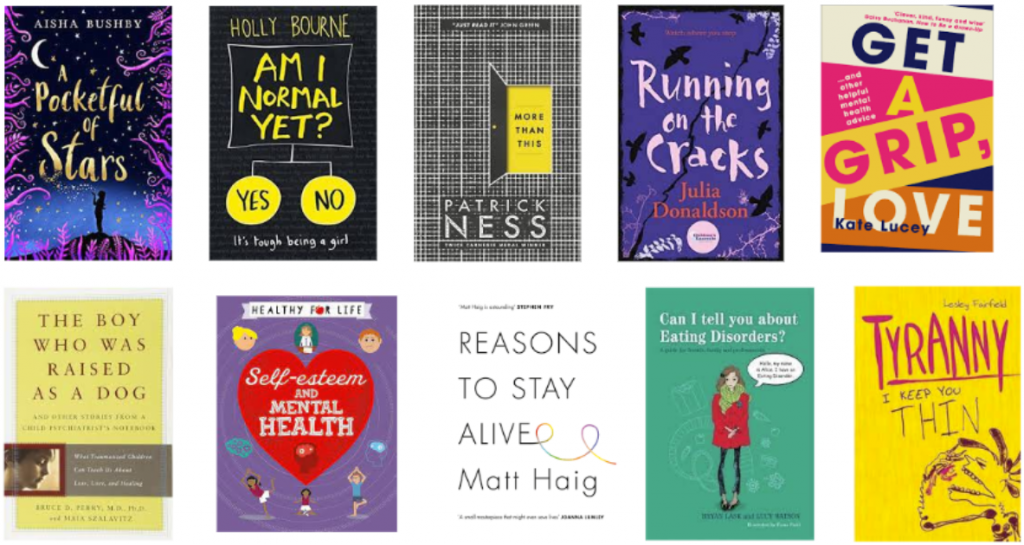
Advice for students
How you can look after your mental wellbeing and spread some MAGIC
Why you shouldn’t be afraid to talk about Mental Health
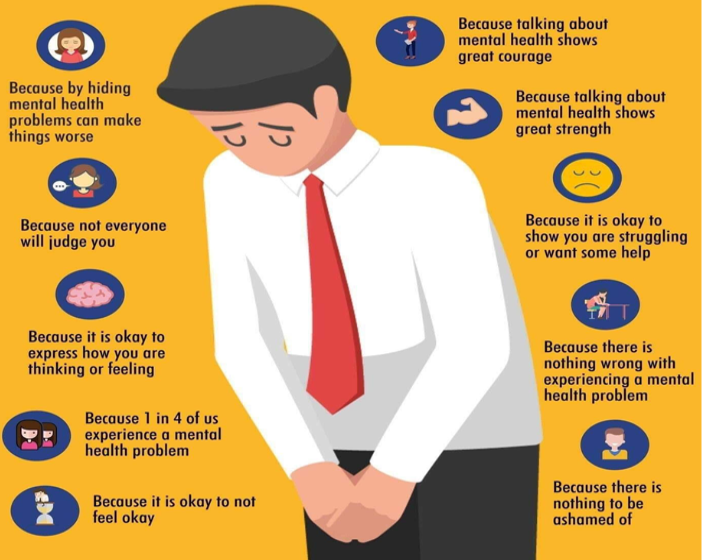
How students can support each other’s mental health
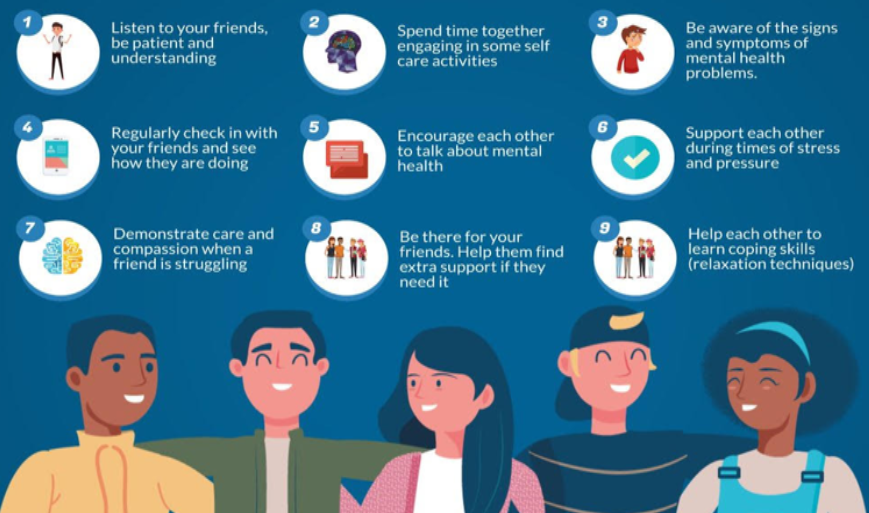
Support for Parents and Carers
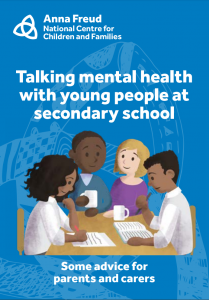 As parents and carers, it can be hard to know whether your child’s feelings and behaviour are normal or becoming a problem. This is especially relevant during adolescence when young people can feel a great deal of pressure and increasingly want to loosen their family ties. The Anna Freud Foundation have produced a useful resource to help you start the conversations with your child along with other useful advice and guidance.
As parents and carers, it can be hard to know whether your child’s feelings and behaviour are normal or becoming a problem. This is especially relevant during adolescence when young people can feel a great deal of pressure and increasingly want to loosen their family ties. The Anna Freud Foundation have produced a useful resource to help you start the conversations with your child along with other useful advice and guidance.
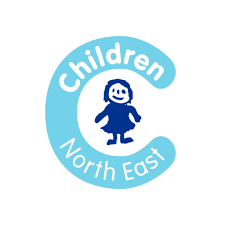
How can my child get support?
If your child is struggling with anxiety, confidence or any other aspect of mental health, we will act swiftly to make sure support is put in place through our referral process. The first port of call is the child’s tutor or Pastoral Leader, who, if appropriate, will make an immediate referral to the Mental Health Support Team.
If you have any queries at all relating to mental health support in school, please contact us at the following email address: mhsupport@whickhamschool.org
External Partnerships
We work closely with a number of external agencies to enhance our mental health support.
Useful Links
Need someone to talk to?
The Samaritans offer a safe place for you to talk any time you like, in your own way, about whatever’s getting to you. 24 hours a day 365 days a year. For an immediate response call 116 123.
The Mix is the UK’s leading support service for young people to help you take on any challenge you’re facing – from mental health to money, from homelessness to finding a job, from break-ups to drugs. Talk to them via online, social or free, confidential helpline.
NSPCC provide information about child protection, advice for adults who are worried about a child, advice for parents and carers or consultations with professionals who come into contact with abused children or children at risk of abuse.
Support Line offer confidential emotional support to children, young adults and adults by telephone, email and post. They work with callers to develop healthy, positive coping strategies, an inner feeling of strength and increased self-esteem to encourage healing, recovery and moving forward with life.
Useful Mental Health Links
Talking Therapies Gateshead are a team of experienced workers offering a free, confidential service for people aged over 16 and registered with a GP in Gateshead. The provide a range of psychological therapies to help you feel better if you’re anxious, depressed, stressed or worried.
Talking Changes Durham provides a service to those aged 16+ who are experiencing a common mental health problem such as; depression, generalized anxiety, specific phobias, panic, obsessive compulsive disorder or post-traumatic stress disorder and who are not already accessing adult mental health services.
Young Minds can help whether you want to know more about how you’re feeling, get information about a mental health condition or want know what support is available to you
No Panic helps people who suffer from Panic Attacks, Phobias, Obsessive Compulsive Disorders and other related anxiety disorders including those people who are trying to give up Tranquillizers. They also provide support for the carers of people who suffer from anxiety disorders
Saneline work to improve the quality of life for anyone affected by mental illness.
The Mental Health Foundation is the UK’s charity for everyone’s mental health. With prevention at the heart of what we do, we aim to find and address the sources of mental health problems.
Rethink provide expert, accredited advice and information to everyone affected by mental health problems. They give people clear relevant information on everything from treatment and care to benefits and employment rights.
On My Mind aims to empower young people to make informed choices about the mental health support they want, the treatments they receive and the outcomes they desire. The site contains information, advice and resources to help young people support their own mental health, including signposting to sources of support in times of crisis and tools to help young people manage their own wellbeing
Papyrus Hopeline UK providing support for children & young people under the age of 35 who are experiencing thoughts of suicide and for anyone concerned that a young person could be thinking about suicide.
Kooth provide free, safe anonymous help for young people on-line
Campaign Against Living Miserably (CALM) for men is leading a movement against suicide, the single biggest killer of men under the age of 45 in the UK
If You Care Share – believe that talking can save lives and encourage people to share their problems instead of burying them within.
NHS Mental Health Services Directory
Time to Change campaign to change the way people think and act about mental health problems
The Mental Health Foundation Website to gives you more information about mental health and to help you to look after your mental health
Tyneside & Northumberland MIND support for anyone experiencing mental health problems or going through a difficult time
Gateshead Council – Mental health and wellbeing support for children and young people in Gateshead – a directory of local and national support services.
The Children’s Society RISE Mental Health Support A range of resources available for children, young people, professionals and parents that offer practical tips to feel more in control and become more resilient in managing emotional wellbeing and mental health.

